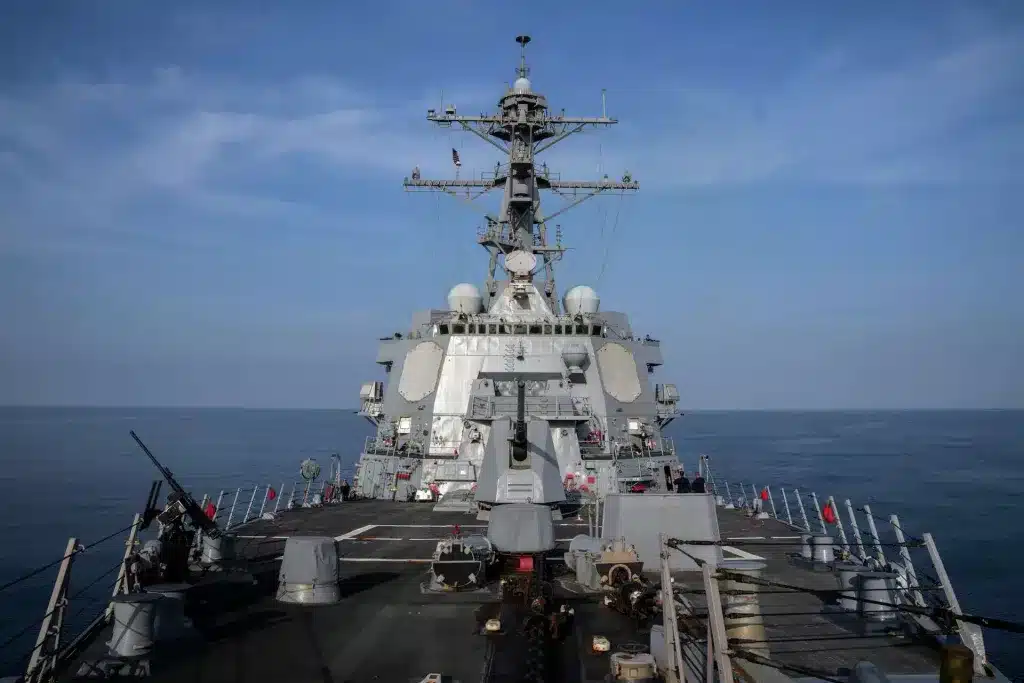
View of USS Gravely (DDG 107), on 13 February 2024. Photo: Bernat Armangue/AP/file photo.

Orinoco Tribune – News and opinion pieces about Venezuela and beyond
From Venezuela and made by Venezuelan Chavistas

View of USS Gravely (DDG 107), on 13 February 2024. Photo: Bernat Armangue/AP/file photo.
Víctor Hugo Majano, founder of the La Tabla news website, stated in an interview with Sputnik that the recent deployment of US destroyers in the Caribbean, near Venezuela, is primarily a part of Washington’s communication strategy aimed at intimidating Caracas.
“This episode is nothing more than an attempt to grab headlines amid a communications offensive against Caracas, driven by an energy dispute and the reconfiguration of drug trafficking in the Caribbean. It’s a psychological operation aimed at creating a climate: criminalizing the adversary, justifying measures and, if possible, enabling covert actions,” he said.
On August 18, Reuters reported that the destroyers USS Gravely (DDG-107), USS Jason Dunham (DDG-109) and USS Sampson (DDG-102) approached Venezuelan waters within a 36-hour period to combat “drug cartels.”
The agency attributed the information to sources linked to the US Department of Defense, and it was quickly replicated by networks such as CNN en Español, Miami-based digital media and social media accounts associated with the Venezuelan far-right opposition.
The news was amplified by headlines warning of an imminent “naval operation” in the Caribbean, while seeking to reinforce the narrative that Venezuela poses a “threat” to US security.
“What’s the point of moving pieces that have been successful against drug trafficking in the Mexican Pacific region to supposedly bring them to the Caribbean? There’s no point. The only point is to ‘free’ the Pacific region from close surveillance and allow the entry of drugs from the Albanian mafia seeking to conquer the West Coast of the United States,” Majano added.
Regional context
For the journalist, the dissemination of this version responds to broader interests than the Venezuelan situation.
“The conspiracy is driven by those who want to control the structures of government. Just as there are legal bourgeoisies that pressure their own interests, there are illegal bourgeoisies linked to drug trafficking that seek to put the state at their service, financing candidates or engaging in violent actions,” he stated.
Majano recalled that Colombian President Gustavo Petro’s recent revelation about the existence of a regional “drug trafficking junta” helps to better understand the background.
“That map has a Caribbean connection. Catatumbo produces for a market that connects with Haiti, the Bahamas and Florida. In return, weapons and ammunition are returned. Haiti has been a laboratory: militias, drones, mercenaries. That same route also supplies Trinidad and Jamaica. And significant volumes of weapons have been discovered in Venezuela, many of them brought in through courier companies linked to the state of Zulia,” he explained.
The analyst added that these are not isolated phenomena. “In Ecuador, the Albanian mafia has been operating for more than 12 years. There is a geopolitical distribution of drugs: cocaine for the Andean-Caribbean region, marijuana more associated with the United States and opium from Asia and the Middle East. The Cartel of the Suns was a narrative device to hide the true structure of the business.”
Regarding the warning from Venezuela’s Interior Minister Diosdado Cabello that the far right would have “until September” to carry out its destabilization plans, Majano offered this reflection: “[Washington] works for short-term results. Marco Rubio focuses that role [on security issues], but I don’t see any viable successes: a lot of media hype, rewards and persecutions, with no real impact on the stability of the Venezuelan government. And there are corporate powers, like Navy officers, who won’t risk their interests in senseless adventures,” he added.
Maduro calls for Militia enlistment
In parallel with this media campaign, Venezuelan President Nicolás Maduro announced a nationwide military enlistment process, scheduled for August 23 and 24, with the goal of strengthening the Bolivarian Militia and ensuring civil-military unity.
“I call on all the people of Venezuela to join the enlistment process for the Bolivarian National Militia, to strengthen the comprehensive defense of the homeland and national peace,” he declared in a televised broadcast.
The president also held a working meeting with the state’s security and defense forces, which included representatives from the FANB (National Armed Force), the Militia, the Bolivarian National Police, Civil Protection and fire departments. The meeting focused on strengthening operational coordination mechanisms and ensuring the protection of sovereignty within the framework of the National Sovereignty and Peace Plan.
China, Iran Condemn US Empire’s Military Threats Against Venezuela
At the closing ceremony of the week, Maduro called for national unity: “This is not the time for political differences or color differences, because one flag covers us: yellow, blue and red,” he said from the elliptical hall of the Venezuelan Parliament, at an event dedicated to the defense of sovereignty and peace in Venezuela, Latin America and the Caribbean, while showing a unity front in front of US threaths.
He emphasized that “this homeland is impregnable” and warned that “no one will touch Venezuela,” vehemently stating that “whoever attacks one attacks all.” Therefore, he insisted: “It is time for courage, for uniting efforts and for putting aside minor differences, to speak with one voice, the voice of the homeland.”
(Sputnik) by José Negrón Valera
Translation: Orinoco Tribune
OT/JRE/SA